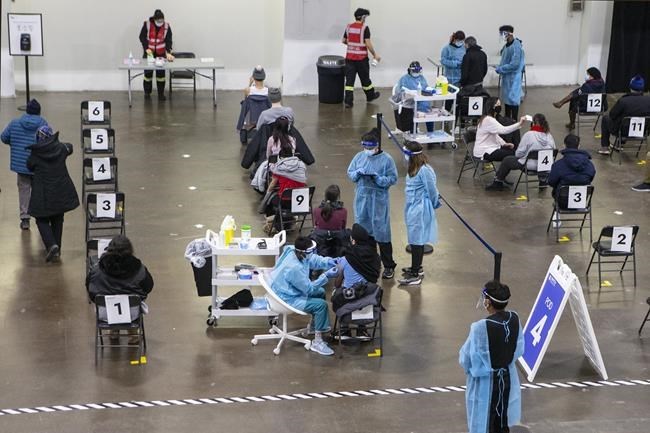Quebec, Ontario, Manitoba and British Columbia reported record high COVID-19 case counts on Christmas Eve as Nunavut ordered a full lockdown to prevent further spread of the virus.
Health officials across the country warned the latest numbers are an underestimation and a sign what is yet to come, and again urged people to rethink large gatherings over the holidays.
Quebec reported just over 10,000 new daily infections on Friday, a record over the 9,397 cases reported a day earlier.
Ontario had 9,571 new cases, a jump from 5,790 on Thursday.
"The Omicron variant is more contagious than anything seen since the start of the pandemic," Quebec Premier Francois Legault wrote in a Christmas message posted to Facebook.
He warned more tough weeks are ahead.
"Due to the highly transmissible nature of the Omicron variant, it was expected that case numbers would increase in the winter months,'' said Alexandra Hilkene, a spokeswoman for Health Minister Christine Elliott.
"We expect they will continue to increase over the coming days and weeks, as other jurisdictions are seeing similar case rate increases per capita.''
Manitoba announced 742 daily cases, its highest yet in the pandemic.
The province's chief public health officer, Dr. Brent Roussin, said the count is likely an underestimate, as the province's testing system is at capacity and there's a backlog of 10,000 tests.
"We've set a daily record so Manitobans need to prepare," Roussin told a news conference.
"Holiday plans need to change. If you're planning on going out, we need people to reconsider that ... if you're going to three or four gatherings this weekend, this should be down to one."
Nunavut, with eight active cases in various communities, put an end to all indoor gatherings by ordering a "circuit-breaker" lockdown.
All non-essential businesses must close in the territory, and travel in and out of certain communities was restricted to essential purposes only.
The order came a day after tighter restrictions were announced in Iqaluit, when a case was confirmed in a person who had not left the city for more than a month.
"With introductions of COVID-19 in multiple communities over the past week, we must move to the strictest public health restrictions across the entire territory," chief public health officer Dr. Michael Patterson said in a news release Friday.
"I understand this will make the holiday season harder for many, but it is necessary for the health and safety of our communities and loved ones."
Also Friday, Nunavut MP Lori Idlout said she tested positive for COVID-19 the day before and was isolating at home in Iqaluit.
"I am double vaccinated, which is helping to keep my symptoms mild," she said in a statement.
'I am sharing my diagnosis as a reminder that the pandemic is still ongoing. Even though we are all tired of the pandemic, it is very important to get vaccinated and get your booster shot when you can."
B.C. reported 2,441 daily cases and a total of 10,415 active cases. The new cases overshadowed the previous record on Thursday of 2,046 infections.
Health officer Dr. Bonnie Henry said B.C. also hit its COVID-19 testing capacity.
She asked residents not to get tested unless they have symptoms and encouraged those who feel they have COVID-19 to self-isolate.
"Omicron is different," she said. "In a sense, we're in a different game, a different pandemic now."
In his annual Christmas message posted on Facebook, Prime Minister Justin Trudeau urged Canadians to "keep showing up for one another'' by following public health measures and encouraging friends and family members to get vaccinated.
This report by The Canadian Press was first published Dec. 24, 2021.
___
This story was produced with the financial assistance of the Facebook and Canadian Press News Fellowship.
Fakiha Baig, The Canadian Press
Note to readers: This is a corrected story. A previous version said Ontario's earlier record of COVID-19 daily cases was 4,812. It also said B.C. had 10,145 active cases.



